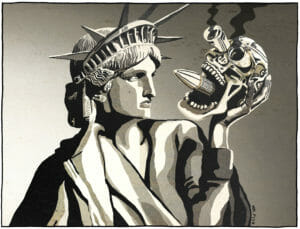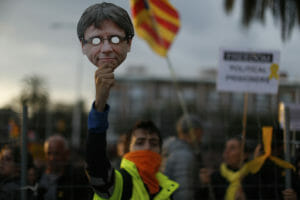Israel Facing Backlash Over Gaza Violence
Turkey expels Israel’s ambassador, Ireland and Belgium summon their Israeli envoys and leading European countries and the U.N. human rights office call for an investigation of the bloodshed.GAZA CITY, Gaza Strip—Israel faced a growing backlash Tuesday and new charges of using excessive force, a day after Israeli troops firing from across a border fence killed 59 Palestinians and wounded more than 2,700 at a mass protest in Gaza.
Turkey expelled Israel’s ambassador, while Ireland and Belgium summoned Israeli envoys. Leading European countries and the U.N. human rights office called for an investigation of the bloodshed.
Israel says it has the right to defend its border against a possible mass breach and accuses Gaza’s Hamas rulers of trying to carry out attacks under the cover of the protests. A military spokesman said Tuesday that 14 of those killed a day earlier were involved in attacks.
Monday marked the deadliest day in Gaza since a 2014 cross-border war with Israel, and was part of a high-stakes campaign by the Islamic militant Hamas to break a decade-long border blockade.
Gaza Health Ministry, which provided the toll from Monday’s violence, said a 9-month-old girl died from tear gas exposure, but medical officials later cast doubt on that claim, saying the infant had a pre-existing medical condition. It remained unclear Tuesday where and how the child died.
In jarring contrast to the Gaza bloodshed, the U.S. held a festive inauguration ceremony for a new U.S. Embassy in contested Jerusalem at the same time Monday, just several dozen miles (kilometers) away. The juxtaposition of violence on the Gaza border and festivities attended by a Trump administration delegation — captured on split screens in TV broadcasts around the world — briefly drew attention to the plight of Gaza and its 2 million people.
The relocation of the embassy from Tel Aviv, condemned by Palestinians as blatantly pro-Israel, further dimmed prospects of what President Donald Trump had once touted as plans to negotiate the “deal of the century.” The Palestinians seek Israeli-annexed east Jerusalem as a capital.
The high casualty toll revived international criticism of Israel’s open-fire policies. Rights groups have said the use of potentially lethal force against protesters who pose no immediate threat to soldiers’ lives is unlawful. The military has said presumably less lethal rubber-coated steel pellets are not effective in keeping demonstrators from the fence.
Germany, Belgium and Ireland called for an investigation of the violence.
In Brussels, Prime Minister Charles Michel called the Israeli actions “unacceptable violence” and said there was a “clear lack of proportionality.” Michel said the violence and killings would be moved onto the calendar of the European Union summit in Sofia on Wednesday and Thursday.
German spokesman Steffen Seibert said the violence “concerns us greatly,” but also accused Hamas of cynically escalating the unrest.
Ireland’s Foreign Ministry summoned the Israeli ambassador to express “shock and dismay.” Turkey asked Israel’s ambassador to leave temporarily and the country lowered flags to half-mast to mark three days of mourning. China called on Israel to exercise restraint. On Monday, South Africa recalled its ambassador to Israel until further notice.
The U.N. human rights office said Israel has repeatedly violated international norms by using deadly live fire to repel protesters from its border with Gaza, suggesting its forces should instead arrest those who reach the fence.
The U.N. Security Council planned to meet Tuesday to discuss the violence, though it was not clear what might come out of the session.
For Hamas, which seized Gaza in 2007, Monday’s border protest was the culmination of a weekslong campaign to try to break the blockade. The group has led weekly protests near the border with Israel since late March.
On Tuesday, there were no signs that Hamas had made a breakthrough in shaking off the blockade imposed by Israel and Egypt. Egypt extended the opening of its border crossing with Gaza, initially set to continue for four days, by two more days, until Thursday. Typically, the Rafah crossing is closed for most of the year.
In recent days, there had been negotiations between Egypt and Hamas, presumably on easing the blockade in exchange for ending the protests.
Hamas has said protests would continue in a weekly format, but it was not clear if it would be able to maintain momentum during the Muslim fasting month of Ramadan, which begins this week.
Khaled Batsh, the head of a grassroots organizing committee, said the next mass march would be held June 5, to mark the anniversary of the 1967 Mideast war in which Israel captured Gaza, the West Bank and east Jerusalem.
Protest organizers said Tuesday was set aside for funerals, in an apparent attempt to lower expectations of another mass protest later in the day. Thousands joined funeral processions Tuesday, though many of those killed Monday had been buried the same day, in line with Muslim tradition.
Hamas had initially said mass border protests would continue Tuesday, which marks the 70th anniversary of what Palestinians call their “nakba,” or catastrophe — the uprooting of hundreds of thousands in the Mideast war over Israel’s 1948 creation. In the West Bank, sirens sounded for 70 seconds Tuesday to mark the “nakba.”
The border marches are seen as Hamas’ last hope of ending the blockade, which has made it increasingly difficult for the group to govern. Other tactics, including three wars with Israel and attempts at reconciliation with the West Bank-based Palestinian Authority, have failed.
The Gaza Health Ministry said eight minors were among those killed by Israeli fire, and that a 9-month-old infant, Layla Ghandour, had died of tear gas exposure. However, a medical official cast doubt on the report, saying the infant had a serious pre-existing medical condition.
The baby’s family said Tuesday that Layla had been taken to the area of the protests by relatives in a mix-up and that she was with her grandmother near the border fence when tear gas fell.
Some 1,360 Palestinians were wounded by gunshots, 130 of whom were in serious or critical condition, the ministry said.
The large number of wounded placed a new burden on Gaza’s already struggling hospitals, where key medicines and surgical supplies were lacking even before the latest bloodshed, in part because of the border closures.
Hospitals and other key installations in Gaza, such as sewage treatment and water pumping stations, heavily rely on generators because of hours-long power cuts every day. Gaza’s power crisis was further aggravated last week when Palestinian vandals destroyed the fuel terminal at Israel’s only cargo crossing into the territory, halting the flow of fuel and gas.
Israel has defended its actions over the past few weeks, saying Hamas is trying to carry out attacks under the cover of protests. The Israeli military said its aircraft had struck 11 “terror targets” in a Hamas military compound Monday and that tanks targeted two Hamas posts. It said Gaza activists used 10 explosive devices and firebombs against troops and that shots were fired at soldiers positioned along the border.
___
Laub reported from Amman, Jordan. Associated Press writers Mohammed Daraghmeh in Ramallah, West Bank, and Tia Goldenberg in Jerusalem contributed.
Your support matters…Independent journalism is under threat and overshadowed by heavily funded mainstream media.
You can help level the playing field. Become a member.
Your tax-deductible contribution keeps us digging beneath the headlines to give you thought-provoking, investigative reporting and analysis that unearths what's really happening- without compromise.
Give today to support our courageous, independent journalists.



You need to be a supporter to comment.
There are currently no responses to this article.
Be the first to respond.